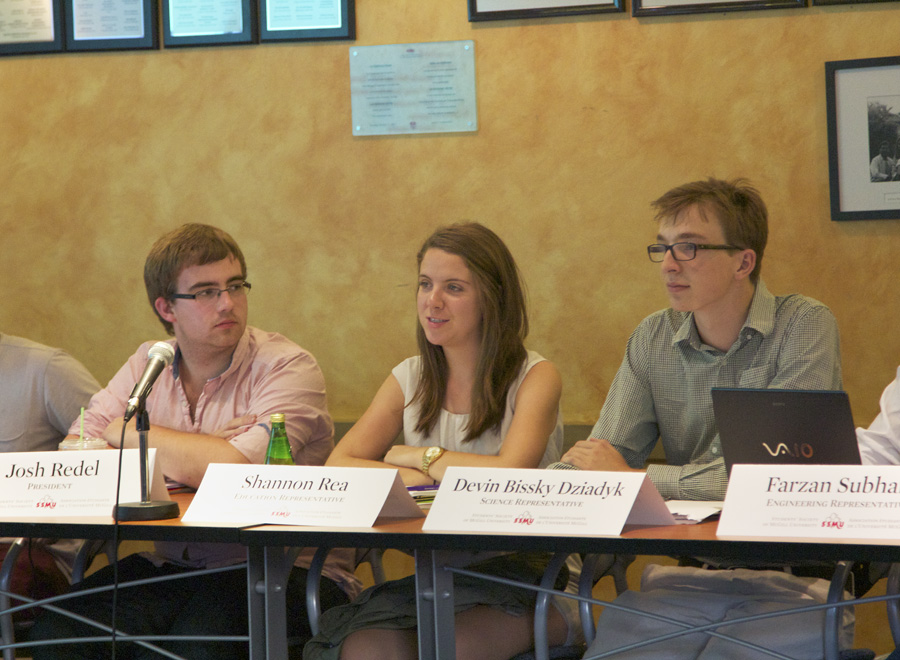The Students’ Society of McGill University (SSMU) is preparing to implement an online ratification system for all resolutions passed at the upcoming General Assembly (GA), as per a referendum question passed last semester. Scheduled for Oct. 1, the GA will also undergo several adaptations aimed to facilitate students’ participation in future debates, including interactive streaming software, workshops explaining procedural rules, and an increased volunteer presence.
Last semester, the referendum question calling for online ratification of GA resolutions cited the low quorum and attendance of GAs as grounds for making the resolutions accessible to those who could not attend the assembly. Previously, as few as 100 students could vote on a GA resolution that would affect more than 25,000 undergraduates.
“An online voting system would allow students to participate in the democratic process, which would produce a decision more representative of the Society,” the motion read.
However, an increased capacity for participants also means that the GA will have to meet a higher quorum—10 per cent of the society’s members—when ratifying decisions online. SSMU Vice-President External Robin Reid-Fraser emphasized the need to accommodate those who are unable to attend the GA, despite the challenge in reaching quorum.
“Just to have another way that people can be participating in the GA is going to add to it, since some people—just because of where they live, or because they have kids, or for whatever reason—can’t be there,” she said. “But if they can just access a laptop and watch, then that could be a great way to make those accommodations.”
The opportunity to view GAs online may limit the number of people willing to physically participate. To address this, SSMU President Josh Redel is looking to use interactive streaming software that will enable viewers to ask questions, submit amendments, and participate in straw polls.
Redel is also looking to encourage higher attendance at GAs by minimizing the time absorbed by procedural delays. For example, in the upcoming GA, voting will be conducted using clickers—the same device used by many students to respond to questions in class.

“These are all technical things, [but] I think people will be so much happier being able to debate than having to spend 20 minutes debating and then spending 40 minutes voting, re-voting, counting, and getting a final decision,” Redel said. “If it can be 60 minutes of debate and then three minutes of getting the final count, then that, to me, is worth it.”
SSMU executives also spent the summer researching how other universities conduct their GAs. This helped them identify other ways to streamline the process, and make it more accessible to students who are not familiar with the rules by which the SSMU GA is run.
“Before the GA actually starts, we want to have a preliminary conversation, debate a bit, and have a workshop with the speakers about the very basics of how things operate during the GA,” Redel said. “There’s also going to be a lot more information as you come in to the GA. It will explain all the changes we’re making [and] how to take advantage of them.”
In addition, there will be volunteers in the aisles to answer questions outside of debate, as well as a “mood watcher”—a volunteer with whom GA participants can silently communicate their concerns, possibly through email or text messaging.
“Basically, people who don’t feel like the GA is being productive, either technically or personally—if they feel like it’s not safe space or something—will be able to communicate with the mood watcher privately,” Redel said. “Then the mood watcher can make announcements to the crowd.”
Allison Cooper, SSMU vice-president clubs and services, said she is hopeful that these changes will improve the general student perception of GAs.
“I think it’s sad that the pessimism around SSMU GAs reached such a [low] point before we were able to make all these improvements,” Cooper said. “As long as students still see the value of debate and having us all come together—which is such a good thing and … rare thing at McGill—then all the streamlining and support will be worth it.”









